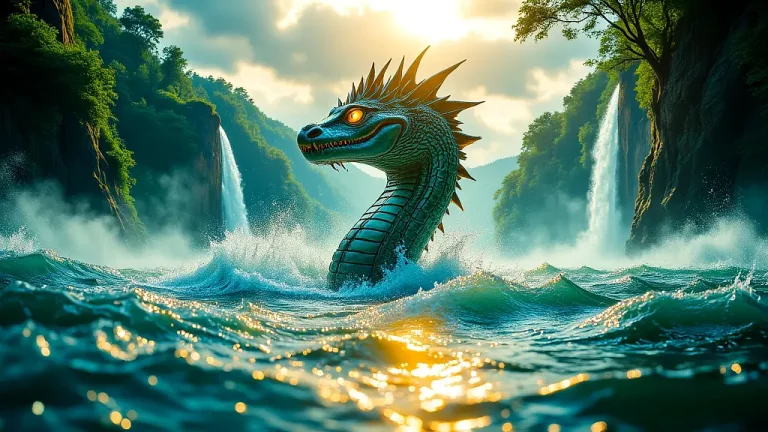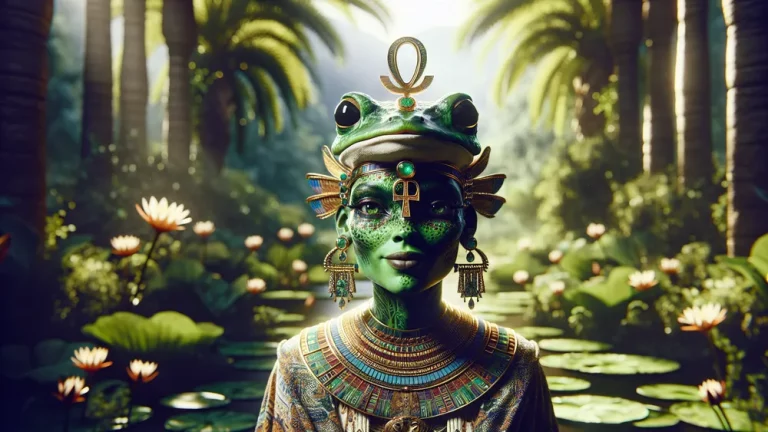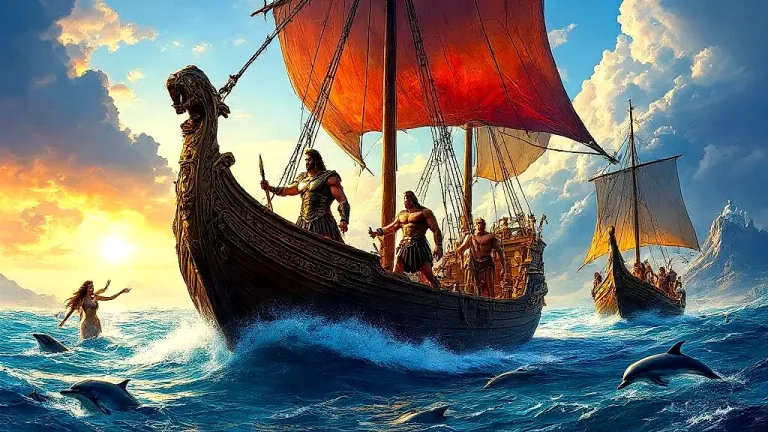Bemba In Mythology: Legends, Symbols, And Cultural Beliefs
People have told myths for a long time, both to explain things about the world and to keep their traditions and beliefs alive. African mythology, just like myths from other parts of the world, is really big, and people have passed it down through spoken stories for many years.
Key Points:
- Bemba is a figure in African myths, sometimes appearing as a warrior, a connection to ancestors, or even linked to nature like water and the sky.
- People think Bemba is important because he represents strength, family ties, and how past generations still influence today.
- Some myths say Bemba played a role in creation, not as the main creator but as someone who kept balance between people and spirits.
- People honor Bemba in different ways, like offering food and objects, saying prayers, and holding ceremonies that connect them to their ancestors.
- Legends describe Bemba as a protector, a guide for lost spirits, and a fighter who only uses his strength when it’s needed.
- Some stories talk about Bemba disappearing, and rituals are still performed today to call on his presence.
- Symbols of Bemba include carved figures, masks, totems, and sacred objects, all representing his power and spiritual connection.
Because of that, it has been a critical way of keeping knowledge alive between generations. One name that appears in these stories is Bemba.
Some people have heard this name in different cultures or in groups of people, but in mythology, it means many things. Depending on where the story comes from, Bemba could be a warrior with great power, a connection to ancestors, something in the sky, or even part of nature, like water. Different places have their own ideas, so the way people think about Bemba is not always the same.
To really understand what Bemba means in mythology, we have to look at who they were said to be, the stories told about them, and why they mattered in rituals and spiritual beliefs. Like many other figures in African mythology, Bemba’s role changes depending on where the story comes from.
In this discussion, we will look at what people believe about Bemba – their place in creation myths, the stories people tell about them, the important symbols linked to them, and how they stand among other African gods and spirits.
When we examine these things, we see more clearly how mythology still plays a big part in shaping both the way cultures understand themselves and how people think about their spiritual lives, even though the stories have kept changing as people have told them over time.
Bemba: Overview and Key Facts
| Category | Details |
|---|---|
| Name | Bemba (the meaning changes depending on the place and tradition.) |
| What Bemba is known for in myths | Said to have strength like a warrior, linked to remembering ancestors, and connected to the sky. |
| Why Bemba matters in culture | Found in spoken stories and often tied to spiritual guidance and protection. |
| What Bemba stands for | Stands for power, family history, and how people today are still tied to those who lived before them. |
| Things Bemba is linked to | In some stories, Bemba is part of water, like rivers that are important, and also the sky and certain animals that people see as symbols. |
| Gods or spirits Bemba might be connected to | Might be linked to important sky gods in Africa or spirits of ancestors. |
| How Bemba is honored | Called upon in events, prayers, and ceremonies that focus on family history and keeping people safe. |
| How Bemba’s story changes | The way people tell stories about Bemba is not the same everywhere – some say Bemba is a god, others say Bemba is a spirit. |
| Bemba in the present | People still talk about Bemba in stories, events, and beliefs today. |
Where Bemba’s Name and Stories Come From
People have spoken about Bemba for a long time. Stories passed from one person to another have helped keep these myths alive, changing little by little but staying important. The name Bemba is part of African traditions where stories are spoken, not written, and handed down from generation to generation.
If we want to know why Bemba matters, we should look at what the name means, where it appears in stories about how things began, and how it connects to respecting those who lived before. These things help explain how Bemba is remembered and why people still talk about the myths today.
What’s the Meaning Behind Bemba’s Name?
The name “Bemba” comes from African traditions, and what it means is not always the same in different groups. Some say it comes from languages in the Bantu family, which many people in Central and Southern Africa speak. It is connected to power, leadership, or coming from gods – things people often say about important mythological figures.
In some places, people think Bemba has a connection to water. Water is very important in many African beliefs because it is pure, helps bring new life, and is linked to those who lived before. But Bemba’s name is not only found in myths.
For example, the Bemba people of Zambia share the name, though it is not always clear if their name and the mythological figure are directly related. Many names in African traditions have meanings connected to gods or spirits.
For example, “Ogun” in Yoruba mythology is the name of the god of iron and war, and this matches what he is known for. Some believe Bemba is the same, with a meaning that connects to protection or religious power.
But because people in different regions have different versions of these stories and pass them down by speaking rather than writing, there is no one true meaning of Bemba’s name – what it means depends on the culture.
The meaning of Bemba is different depending on the group, with some linking it to leadership or gods, others to water, and since different cultures pass down stories in their own way, there isn’t one single definition.
Bemba’s Role in African Creation Myths
Stories about Bemba and creation are not always the same.
Different places tell different stories about Bemba as part of the world’s beginning, and since these stories are passed down by speaking rather than writing, they have changed over time. Unlike well-known creator gods like Nzambi from the Bakongo or Amma in Dogon beliefs, Bemba is not always seen as the main one who made everything at the beginning.
Still, in some myths, Bemba is linked to spirits of ancestors or beings from the sky who were there when the world took shape. Some say Bemba helped balance things between the world of people and the world of spirits. This matches with African traditions where creation is not always the work of just one being but instead happens through a group of gods, spirits, and nature working together.
Some versions of Bemba’s story connect him to water. Water is seen as very important in many African beliefs because it gives life and is also a space between the world of people and the world of spirits. Some African myths say life began in water, similar to how the ancient Egyptians talked about Nun, the dark waters before everything was made.
If Bemba is connected to sacred rivers or lakes, this might mean an indirect connection to creation, not as the one who made the world, but as one who keeps life going. But stories about Bemba do not stay the same everywhere.
What Bemba means in myths changes depending on where the stories come from and who tells them. Some see Bemba as a significant protector of ancestors rather than as a creator. Since mythology in Africa is passed down through speaking and changes over time, there is no single story that makes Bemba the main creator of everything.
Instead, the name Bemba is more closely connected to the worship of ancestors and protecting the living.
Bemba’s Symbolism in Honoring Ancestors
In many African religious customs, Bemba is seen as a guardian who connects the living with those who came before. People believe that ancestors can help them when properly remembered and honored. Giving respect to past generations is considered important, not just for tradition, but also to bring good fortune and balance to life. Because of this belief, people use symbols, rituals, and prayers in ceremonies connected to Bemba.
In these practices, ancestors are thought to still have an effect on the world today, but only if they are given the right attention. People use sacred objects and special ways of speaking during these ceremonies to keep the connection strong. Other cultures have similar customs.
In ancient Rome, families believed in spirits called ‘lares,’ which protected their homes, and in parts of East Asia, people keep family altars to honor their ancestors.
Since beliefs differ from place to place, the ways people represent Bemba also change. However, the main reason stays the same: keeping ancestors satisfied and making sure they remain part of daily life. Here are some ways Bemba is honored in these traditions:
- Giving Offerings: People place food, drinks, or special objects on small altars to show respect to Bemba and the ancestors.
- Speaking Chants and Prayers: Specific words are said to ask for protection, wisdom, or good fortune.
- Hosting Family Feasts: In some cases, large gatherings with music and dance are held to celebrate ancestors, and Bemba’s name may be included in these events.
- Using Symbols and Figures: Some use animals, carved objects, or drawings believed to represent Bemba when remembering their ancestors.
- Cleansing Rituals with Water: Since Bemba is sometimes linked to water, some people use washing ceremonies to remove bad influences and honor those who came before.
Since these traditions are passed down by speaking rather than writing, what people do in these ceremonies is not always the same. Yet the goal remains clear: keeping the relationship between the living and the ancestors strong.
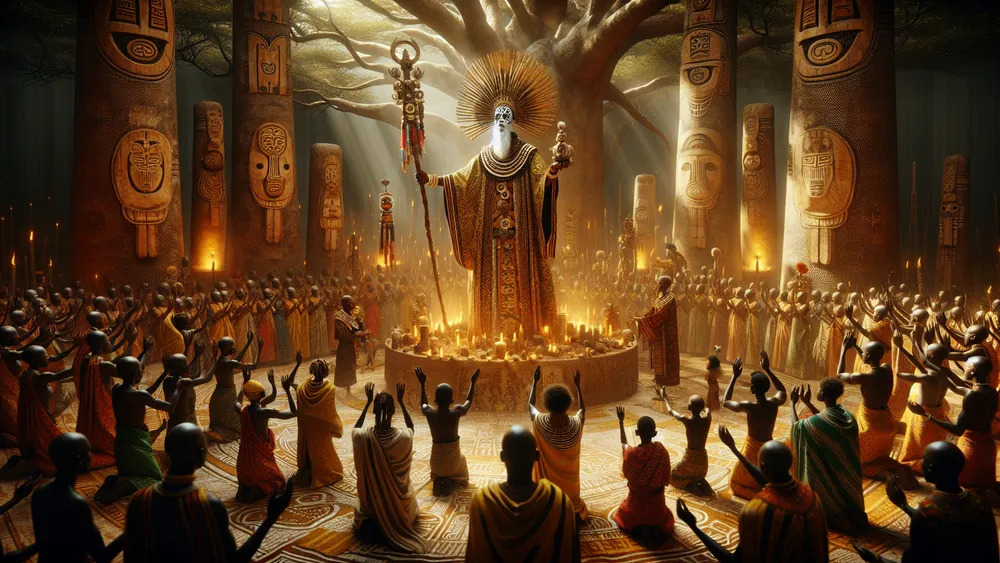
The Stories and Legends of Bemba
Bemba is important in more than just honoring ancestors. Many stories describe Bemba as part of battles, religious places, and mystical happenings. Stories of great battles, strange travels, and important rivers have shaped what people believe. Some of Bemba’s stories have lasted many years, and here are some of the most talked-about ones. Instead of just focusing on ancestors, these stories explain other roles connected to Bemba.
Over time, people have told many stories about Bemba, shaping the beliefs of different groups.
The Tale of Bemba, the Divine Warrior
Bemba was known as a powerful fighter and a protector. People say he was sent by the spirits of past generations to protect others from strong, dangerous beings. In many stories, he is described as coming from the sky, carrying weapons that held special power. Some believed these weapons had energy from the gods.
When he arrived, he brought balance between different worlds by defeating those who caused harm. In Yoruba mythology, Ogun is a god who makes weapons and fights battles. Bemba is similar because he is both a strong fighter and someone who protects what is right. He does not fight just to fight.
He only battles when he must, to keep things in order. In the stories told about him, he was not only a warrior – he was a guardian. One of the most well-known stories is about a terrifying being that came from the ground. It caused both disorder and sickness. The creature had skin as hard as stone, and it could make people starve.
Everyone who tried to defeat it failed. But Bemba had a weapon that was said to be made from the stars. He fought for many days. The creature was powerful, but Bemba had endurance and a plan. He learned the creature had a weak spot and struck it, defeating it.
This story means that, in the end, intelligence and patience win over strength alone. Beyond his victories, people also see Bemba as an example of a leader. His legend is still told when teaching warriors about responsibility. Some African warrior traditions say that a soldier must have wisdom, not just fighting ability.
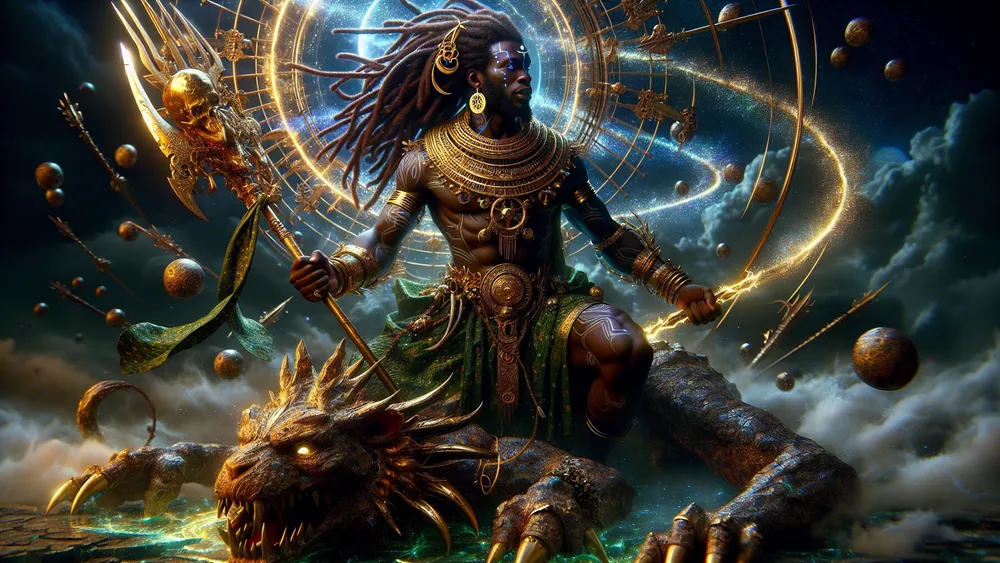
Bemba represents this idea: he is someone who fights, but only when needed and only to protect others.
Bemba and the Sacred River of Spirits
There are many stories where Bemba is linked to a river that people think connects the living world with the spirit world. People say this river never stops moving, and no one has ever seen it dry up. Spirits live there, acting as messengers between different realms. Some stories describe Bemba as not only a warrior but also a guide.
He helps the souls of the dead reach their final resting place rather than being trapped in the world of the living. Many African traditions believe water is deeply important, not only as part of life but also as something that connects different worlds.
Like the Yoruba spirit Olokun, who is in charge of the deep sea, or the Egyptian god Hapy, believed to control the waters of the Nile, Bemba’s connection to the river means protection and continuation of life. Some say that if a soul is lost, maybe because someone died too soon or had unfinished things left behind, Bemba’s voice can be heard in the water, guiding them back where they belong.
Aside from guiding souls, people believe this river also gives wisdom and good fortune to those who respect it. Along the riverbanks, rituals take place. People give water as an offering, wash themselves to clear their spirits, and say chants speaking Bemba’s name. In some traditions, warriors who died in battle were washed in a sacred way here. This marked their move to an honored place among ancestors.
Greek mythology has a similar idea with the River Styx, said to decide where souls go after death. But in Bemba’s story, the river is not a place of punishment. It simply helps souls find the right place.
Some people say that, though it does not happen often, Bemba can be seen shining near the river. They believe this event signals that something important will happen for a person or their group – maybe an upcoming change or an event that will affect many.
The Mystery of Bemba’s Disappearance
There is a story about Bemba’s unexpected disappearance, and it has left many unsure about what really happened. Some say Bemba left this world when his sacred role was complete.
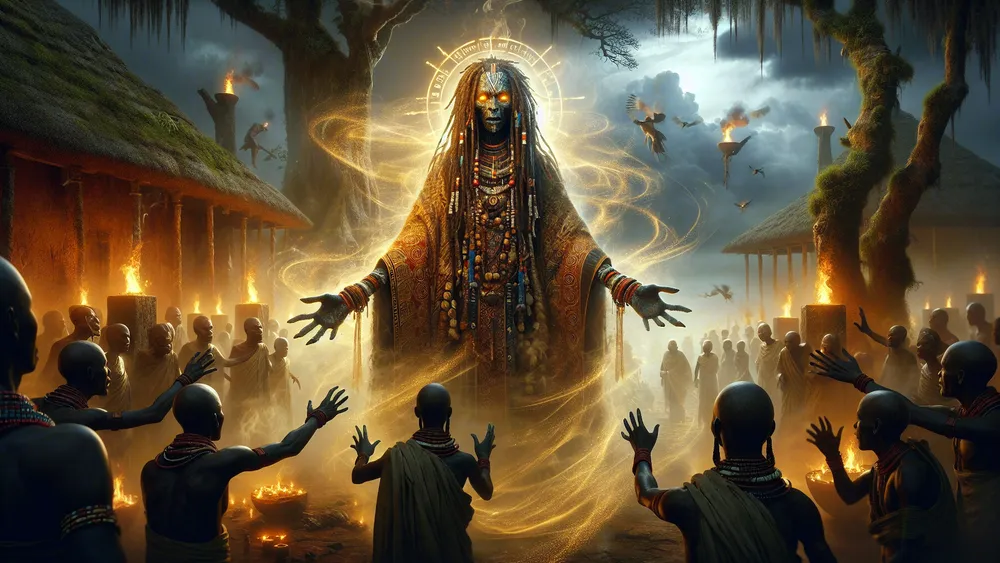
Others believe that powerful gods became jealous of him and forced him to leave. Another version says that he saw people drifting away from the ways of their ancestors, so he decided to go, either to punish them or to test their faith. Many religions have stories where powerful beings leave for a time.
In one Aztec story, the god Quetzalcoatl left but said he would return. Some Greek stories say that Apollo left Delphi, and during that time, there were no prophecies. People think that after Bemba left, the way things worked in religion changed, which led to the creation of rituals meant to call him back. Bemba disappeared, and this greatly affected local religious practices.
Some groups created ceremonies to help them feel his presence again. People gather every year to repeat symbolic events showing his departure and hoping for his return. When there is trouble, religious leaders call out Bemba’s name, hoping he is listening. Some claim to have seen him in storms, in holy water, or in strange events in nature.
Many similar stories in different places say that gods who leave do not fully go away, but stay in some form. Some African beliefs say that spirits do not truly die but sleep instead. People say Bemba’s power never disappeared completely. It only changed, waiting for the right moment to be noticed again.
Bemba mysteriously disappeared, and ever since, people have tried to bring him back through rituals, believing his presence still exists in different forms.
Symbols and Sacred Items Connected to Bemba
For a long time, people have used different symbols and objects to respect Bemba. These items do not just exist for decoration; they represent his special presence and strength. Some are connected to religious customs, while others are seen as powerful objects on their own. People have different ways of honoring him.
Now, we will look at important objects, symbols, and customs. Some of these hold spiritual meaning. Others are used in ceremonies to connect with Bemba. Each has its place in the traditions that have been passed down.
Objects That Represent Bemba
In many traditions, there are certain holy items that people connect to Bemba. Each one has an important meaning in religious practices. People use these objects in important ceremonies, give them as gifts, or use them when calling on ancestors. Some of these respected objects are:
- Carved Figures: People make these from wood or stone to stand for Bemba’s power. They are placed in shrines, homes, or special places where people gather to pray and give offerings.
- Protective Amulets: Small objects made from iron, beads, or other things believed to have power. Warriors and religious leaders wear them, believing they give strength during fights or hard times.
- Sacred Spears: People often use these weapons to represent Bemba. Before battles or big gatherings, they go through special prayers to make them holy.
- Ritual Drums: In ceremonies, these drums are played so people can connect with Bemba. The sound is thought to carry messages to the world of spirits.
- Holy Masks: Some masks are used in special ceremonies and show Bemba in a way that represents who he is. They remind people of his role as a protector and guide for those who have passed away.
All of these objects are important in stories about Bemba. They keep the idea of him alive as a protector god. Followers continue to use them because they believe they bring a connection to Bemba, which keeps his presence alive in their lives.
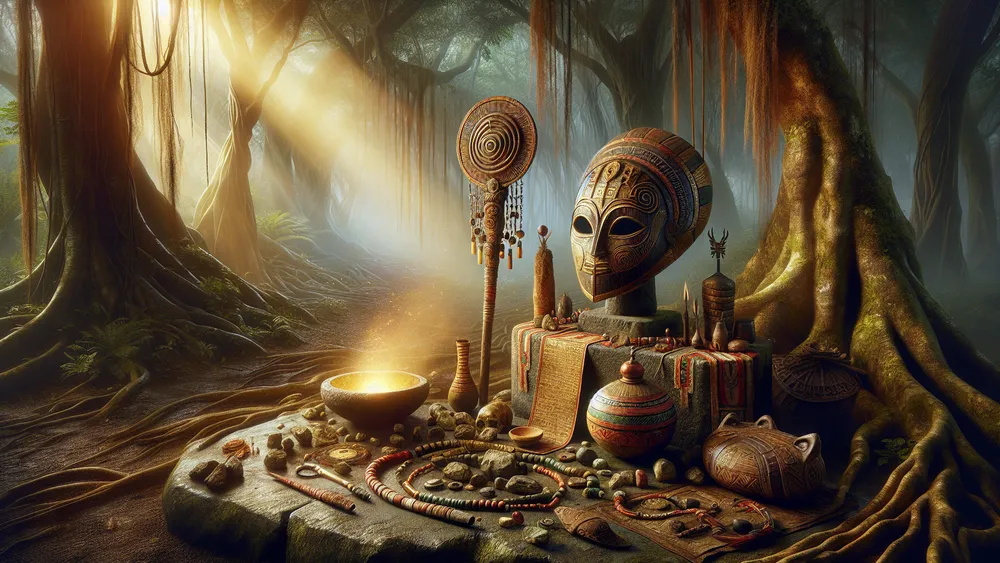
The Meaning of Totems in Bemba Worship
Totems are very important in how people honor Bemba. They are holy signs that hold his spiritual presence and help people feel close to their ancestors. In some groups, animals like lions and eagles are seen as sacred totems. These animals stand for his power, knowledge, and the way he looks after his people. People think the lion, which is strong and unafraid, is part of Bemba’s warrior side.
It represents his ability to lead and protect those who believe in him. The eagle flies high, which means he is linked to the skies. Followers see this bird as a sign of his wisdom and his power to guide those who seek answers.
Some groups also see certain trees, like the baobab, as important because they believe these plants hold energy and can live for a long time, which they connect to Bemba himself. During ceremonies, people use these totems in different ways. They pray, perform dances, and speak important words to keep their connection with Bemba strong.
Others believe wearing lion symbols offers protection, while eagle shapes are carved into special objects. Some leave gifts under baobab trees as a way of honoring him. In other traditions, clans also have animal totems that are tied to their beliefs. The totems of Bemba work in the same way. They remind followers of his lasting effect on both the world they see and the one they cannot.
How People Honor Bemba: Rituals and Traditions
People honor Bemba through important ceremonies that help keep their bond with him strong. These traditions include giving gifts, saying prayers, and holding large gatherings that celebrate his lasting presence. Some of the most followed customs include offering items, calling on ancestors for help, and organizing festivals where whole communities take part. People give gifts of food, handmade things, or special tools.
They believe these bring Bemba into their lives and keep his favor. Elders say special prayers in important places, often with drumming, chanting, and sometimes wearing clothes that stand for Bemba’s warrior side. Some ceremonies involve personal actions, like leaving gifts, while others bring people together in big gatherings. These events allow entire communities to act out stories about Bemba.
In many places, people honor their gods in a similar way. They hold ceremonies again and again to keep their faith alive. Bemba’s followers see their traditions as ways to remind themselves that he is still with them, not just in stories but in everyday life.
The table below lists important rituals related to Bemba and what they mean:
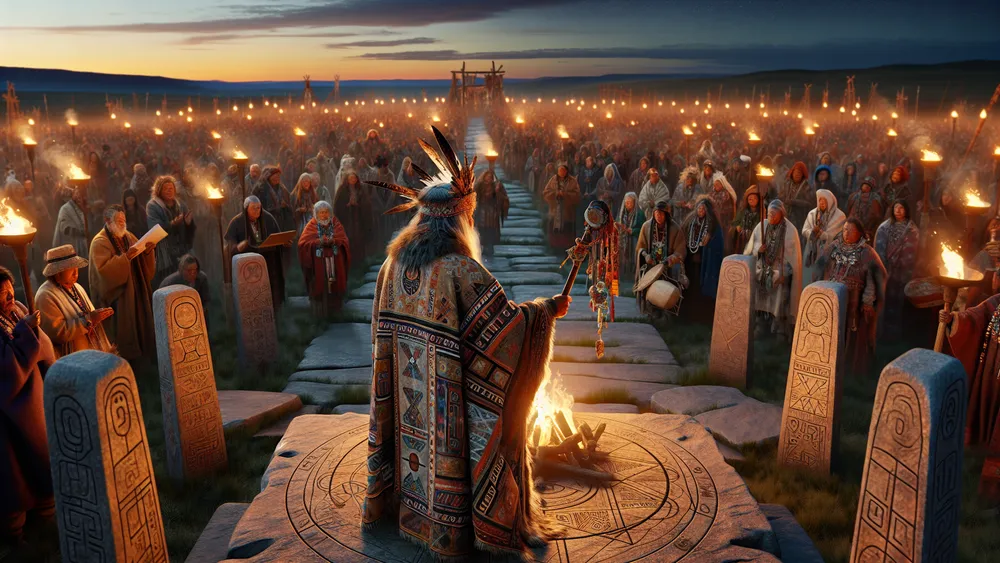
| Ritual Name | Purpose and Meaning | Mythological Role |
|---|---|---|
| Offering of Spears | People place weapons in shrines as a sign of protection. | This stands for Bemba’s place as a warrior god watching over his followers. |
| Sacred Drumming | Rhythmic beats are played to reach Bemba’s spirit. | Believed to connect the world of people with the world of spirits. |
| Calling on Ancestors | Elders say prayers at important places to get guidance. | This helps people believe that Bemba speaks through ancestors. |
| Festival of the Vanishing Warrior | A large event where people act out stories of Bemba’s disappearance. | This means people are still looking for knowledge and believe Bemba will come back one day. |
Each of these traditions is important in keeping Bemba’s stories and presence alive. People do these things because they believe it makes their bond with Bemba stronger.
Bemba’s Connection to Other African Gods
Bemba, like many gods in African beliefs, is not separate. He is connected to other gods. Just like many other gods, he is part of a greater system where his power works together with or against others. In many stories, gods do not exist alone.
His ties to sky gods, friends, and enemies help explain his importance. We can look at how he is connected to other gods to get a clearer idea of what he does.
Bemba and the Gods of the Sky
In different African beliefs, Bemba’s link to sky gods changes. Sometimes, it puts him in a complicated place with powers from the sky. For some, Bemba is a fighter beneath a greater sky god. People compare him to thunder gods in other traditions, like Shango from Yoruba beliefs, who follow the orders of more powerful deities.
Other stories paint a different picture, where Bemba himself takes on the features of the sky, and this can include storms, strong winds, or even the sun’s strength, making him a powerful figure not just of the earth but of the skies too. In some stories, Bemba calls to the sky for power.
This makes people believe his strength comes from the blessings of sky gods, not from ruling the skies himself. Because ancestor traditions are strong in certain places, people see Bemba as someone between human spirits and sky gods. Unlike gods who rule the sky directly, his power comes in another way.
This makes him appear as a go-between for people and gods. His power connects to the heavens, which is why stories of sun, storms, and wind surround him. This shows a complicated connection between a fighter’s power and the way sky gods rule.
Bemba’s Friends and Foes in Legends
People describe Bemba as a warrior god. His friendships and fights change the stories about him. In some stories, Bemba was a trusted friend of a wise god. He was given the duty of making sure the gods’ laws were followed. Some say Bemba stood beside the highest gods, but others believe he turned against them, which caused a great fight.
A serious betrayal happens in some versions of the story. Bemba questions the decisions of the high gods. This leads to a famous battle, ending with him either being forced to leave or choosing to go away himself. Stories like these can be found in other African traditions.
For example, the Yoruba tell of Ogun, a god of war and iron, who had a difficult connection with Obatala, a god of purity and creation. This makes clear that warrior gods can both protect and fight against the order of things. Aside from fights with sky gods, Bemba also battles other warrior spirits who try to take over places considered sacred.
One story speaks of a great battle between Bemba and a fire god that causes destruction. This means there is a never-ending fight between controlled power and wild destruction. The idea of such struggles exists in many stories, including those about Unkulunkulu, the Zulu great god, who had to face strong enemies that upset the order of nature.
People do not see Bemba as fully evil. Instead, he stands for a struggle that affects both gods and people.
Bemba is seen as a warrior god whose loyalty and actions change across stories, sometimes protecting order, sometimes shaking it, leading to great battles that decide his fate.
The Many Gods of African Mythology
African myths are big and different. Each group of people has its own gods, and these gods control what happens in nature, have power over life itself, and even take part in things that go beyond the earth.
There are creator gods like Nyame, worshiped by the Akan people, and strong spirits like Shango, who belongs to Yoruba traditions. These holy figures have important jobs in making sense of the world’s power and affecting people’s lives. Some gods have all the power and stay far away.
Others take part in everyday life, giving safety, knowledge, or problems to people. Because myths come from many places, the gods in them are not all the same.
This means that gods control different things, and while some have great strength, others focus on smaller matters. If you want to learn about a large number of gods in African traditions, you can check this full list with all African Gods, which gives a look at many gods and what they do.
FAQs
1. What is Bemba’s significance in African mythology?
Bemba’s significance in African mythology lies in its role as a powerful ancestral spirit and warrior deity, symbolizing protection, guidance, and the connection between the living and the spiritual realm.
2. How was Bemba traditionally worshiped?
How Bemba was traditionally worshiped involved elaborate ceremonies, offerings of sacred items, and chants invoking ancestral spirits to seek guidance and protection.
3. Are there any surviving temples or sites dedicated to Bemba?
Surviving temples or sites dedicated to Bemba have not been widely documented, but some sacred locations associated with Bemba’s worship may still exist in oral traditions and local spiritual practices.
4. What symbols are most commonly associated with Bemba?
The symbols most commonly associated with Bemba include sacred carvings, ritual masks, and ancestral totems that represent his spiritual presence and mythological significance.

